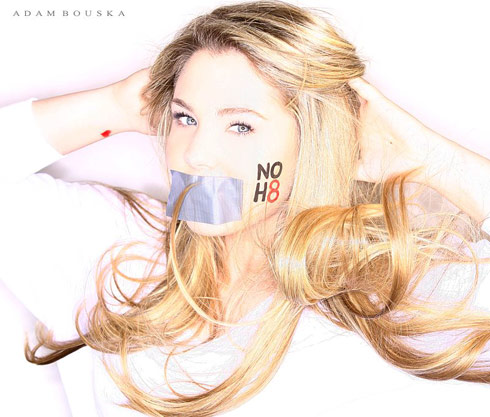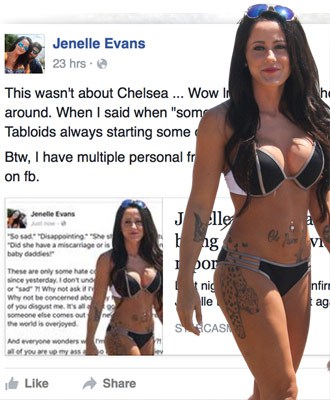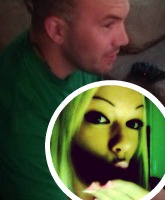Teen Mom 2’s Kailyn Marroquin joins MTV’s Look Different campaign as Good Look Panelist
Back in April MTV announced its “Look Different” initiative in partnership with a coalition including the Anti-Defamation League, NAACP, National Council of La Raza, National Partnership for Women & Families, The Trevor Project and many others. According to the press release (included below), “the campaign reflects Millennials’ deep commitment to the principles of equality and fairness, while inviting them to look differently at subjects like privilege, prejudice and ‘colorblindness.'”
As part of the Look Different” campaign, it was announced earlier today that there will be a celebrity “Good Look Panel” that will feature people in the public eye talking about their own experiences with prejudice and bias. Among the list of folks participating on the “Good Look Panel” are fun frontman (and Lena Dunham beau) Jack Antonoff, Girl Code‘s Tanisha Long and Teen Mom 2 star Kailyn Lowry Marroquin!
“After seeing racism first hand being in an interracial marriage, I have made it a personal mission to make everybody equal no matter their size, shape, color or creed,” Kailyn says. “I have tried to bring awareness to equality and would like to continue to make noise in an effort to erase racism/sexism and anything else ‘Look Different’ fights for. Whether we look different or love different, we’re all people.”
Kailyn will be taking questions in a live Twitter chat later today at 4PM EST via the @LookDifferent Twitter handle. To join the conversation, simply use the hashtag #AskKailyn.
To participate in the Look Different conversation at any time, just use the hashtag #goodlook to share examples of prejudice and/or biases being challenged and the hashtag #notagoodlook to highlight instances that appear to promote prejudice and/or bias.
So what does MTV plan to do with your messages, aside from retweeting? From LostRemote.com:
MTV has created an on-air promo spot where every week they will feature 1-2 new #GoodLook photos, Vines, tweets, etc. that were submitted with the hashtag via any social platform that uses hashtags. The promo spot will run throughout the day on the network and in primetime and debut at the end of July.
The “Look Different” campaign has numerous other facets as well, including:
The Look Different Challenge – This is your opportunity to tell us your creative ideas for a digital tool that would help you and your peers have meaningful conversations about bias. You can enter the challenge by yourself, or as a team of up to 5 members, and if we pick your idea, you’ll take home $10,000! Applications due: August 18, 2014
Implicit Association Test – Take Look Different’s Implicit Association Test on race – featuring Pink, Kendrick Lamar, Macklemore, Kelly Rowland, and more – to uncover your own biases. This quiz, created in partnership with Project Implicit, requires you to sort pictures or words into groups as fast as you can. At the end, you will receive your results and some information about what they mean. This quiz will only take about 5 minutes. There are two parts: the quiz itself and a short survey about you.
Bias Cleanse – Interested in working on your own biases? With input from the Kirwan Institute for the Study of Race and Ethnicity, we’ve created a seven-day racial bias cleanse that will provide you with daily tasks that will help you begin to de-bias yourself.
Broken Glass video campaign – PSA videos highlighting what it is like to experience bias.
Look Different on Tumblr – Collection of videos, photos and everything else showcasing empowering anti-bias messages.
Get your scroll finger ready because here is the full MTV press release from back in April, complete with a logo that we made look different:
MTV LAUNCHES MULTI-YEAR CAMPAIGN TO HELP YOUTH ACCELERATE FIGHT AGAINST RACIAL, GENDER & LGBT INEQUALITY
New MTV Study Finds Equality and Fairness to be Hallmark Millennial Values, Yet a Lack of Historical Perspective Can Cloud their Vision; 2/3rds of White Millennials Believe Having a Black President Proves People of Color Now Have the Same Opportunities as Whites
Initial On-Air Programming Addresses “Whiteness,” Microaggressions and Privilege; Online Elements Include Racial Bias Cleanse and Implicit Bias Quiz
New York, NY, April 30, 2014 – Today, MTV – in partnership with a coalition including the Anti-Defamation League, NAACP, National Council of La Raza, National Partnership for Women & Families, The Trevor Project and many others – launched “Look Different,” a multi-year campaign empowering America’s youth to better counter the hidden racial, gender and anti-LGBT (lesbian, gay, bisexual and transgender) biases all around us. The campaign reflects Millennials’ deep commitment to the principles of equality and fairness, while inviting them to look differently at subjects like privilege, prejudice and “colorblindness.” Original research MTV conducted over the last year shows that a commitment to fairness, coupled with lack of historical perspective, can result in a clouded view; as an example, half of white Millennials now believe discrimination against whites has become as big a problem as discrimination against people of color.
Look Different will help young people better recognize and respond to bias – which most encounter on a daily basis and most find difficult to discuss openly – by leveraging MTV’s core assets, including on-air programming, social media reach, innovative digital tools, celebrity engagement and much more. Select elements unveiled today include: “Untitled Whiteness Project,” a documentary-style program that will explore how America’s “minority-majority” future is complicating white Millennials’ views on race and what’s fair; “True Life: I’m a Gay Athlete”; a PSA series on microaggressions; an Implicit Bias Quiz that helps unearth unconscious biases; and a seven day Racial Bias Cleanse, scientifically-grounded and designed to help people begin unlearning biases that have built up over years.
“Millennials are the most diverse generation in history and it’s inspiring to see how equality and fairness serve as their bedrock values,” said Stephen K. Friedman, President, MTV. “However, that very faith in equality can also cloud their perception of historical and institutional inequities. Rooted in powerful storytelling, Look Different will offer our audience a new forum and tools to more deeply explore these issues, while supporting their fight for a more equal future.”
MTV has convened a world-class coalition of expert partners to help steer the “Look Different” campaign, including the Anti-Defamation League, Asian Americans Advancing Justice | AAJC, Council on American-Islamic Relations, Council on Contemporary Families, Define American, GLAAD, GLSEN, Kirwan Institute, NAACP, National Council of La Raza, National Partnership for Women & Families, Project Implicit, Southern Poverty Law Center and The Trevor Project.
Original MTV Research: For nearly the last year, MTV has been closely studying Millennials’ perceptions of subjects like fairness, equality, privilege and discrimination – with a special emphasis on race, which will be the main focus of the first chapter of the Look Different campaign. Some findings from the comprehensive, nationally-representative study* of Americans 14-24 years old include:
On Race
· 9 in 10 believe that everyone should be treated the same, no matter what their race
· 64% of young whites believe having a black President demonstrates that people of color now have the same opportunities as white people
· 65% of young people of color feel white people have more opportunities than racial minority groups – a 26 point difference from young whites (39% agree)
· This subject also breaks along ideological lines, as 68% of those who identify as Democrats believe whites have more opportunities vs. just 40% of those who identify as Republicans
· Further, 36% of young whites believe the gains people of color have made in recent years have come at the expense of white people
· 58% of respondents believe that as their generation moves into leadership roles, racism will become less and less of an issue
· 3/4s of young whites believe it’s never fair to give preferential treatment to one race over another, regardless of historical inequalities (65% for young people of color)
· 58% of respondents – including 63% of young whites and 52% of young people of color – believe people of color use racism as an excuse more than they should
On Bias & Microaggressions
· 94% of those surveyed see bias – defined as “treating someone differently, and often unfairly, because they are a member of a particular group” – in their lives
· 8 in 10 say they know someone who is biased, yet 59% deny they are personally biased
· 60% say they have worked hard to eliminate their biases
· 9 in 10 believe small examples of bias can add up to major problems for society
· Further, more than half (53%) believe “bias is a serious problem, but it is mostly hidden”
· 8 in 10 believe bias is at the root of a lot of the problems facing the world today
· 61% of respondents have been the target of bias, with those most affected including LGBT (85%), people of color (69%) and women (64%)
· Half of young people of color feel that “individual microaggressions, when added up, have had a serious effect on me”
· 60% of young people of color – including 74% of young Asian Americans – are often asked about their ethnic background vs. just 19% of young whites
On Equality & Solutions
· 72% feel that “people my age believe in equality more than older people”
· Nearly 3 in 4 Millennials believe that we should talk more openly about bias and that “having more open, constructive conversations about bias will help people become less prejudiced” (73%)
· However, a majority of respondents feel “it’s hard to have respectful conversations about bias” (54%), most Millennials say they never or rarely talk about it (52%) and only 20% are very comfortable discussing the subject
· 78% believe that everyone has a responsibility to help tackle bias; 65% wish they knew more about how to address bias when they see it
An executive summary and the full study are available at http://research.lookdifferent.org
Programming and Promos: MTV today debuted the first of a series of thought-provoking PSAs that invite young people to take a closer look at common microaggressions and the impact they have on those who regularly experience these slights (see: It Adds Up 1 & 2). Other upcoming on-air programming includes:
· “Untitled Whiteness Project”: While America as a whole is expected to become a “minority-majority” country in 2043, the Census Bureau projects that racial minority groups will make up more than half of children under 18 years old in the next four years. This documentary-style program will explore how Millennials are navigating this new frontier of diversity and what it means to be a young white person in America in 2014.
· “True Life: I’m A Gay Athlete” – Wednesday, May 7th, 11:30pm ET: Airing the night before the 2014 NFL Draft, where Michael Sam is expected to become the first openly gay pro football player, MTV’s Emmy-winning series will follow two gay college athletes as they struggle to come out to their teammates and families.
LookDifferent.org and @LookDifferent: The campaign hub and social footprint (Twitter – Tumblr) will have a strong pop culture bent, helping young people recognize bias in themselves and their surroundings – while providing clear guidance and helpful resources they can use to challenge bias when they see it. Components include:
· Implicit Bias Quiz: In collaboration with Project Implicit, a non-profit hosted at Harvard, MTV has developed a custom Implicit Association Test, a simple but powerful tool designed to unearth unconscious biases. The MTV test features some of the biggest names in pop culture and asks users to pair the artists’ photos with words like “joy,” “peace,” “terrible” and “hurt.” The test has a tendency to reveal automatic associations that are quite surprising – and can be unsettling.
· Racial Bias Cleanse: MTV’s seven day “de-biasing” regimen delivers scientifically-grounded, daily exercises to help people begin unlearning biases that have built up over years. Developed in partnership with the Kirwan Institute, the cleanse includes activities like setting a counter-stereotypical image as the background on your phone, intergroup contact and consuming media that helps build empathy for people of other races.
· Snap Judgment: When a visitor lands on LookDifferent.org, the site immediately begins challenging their assumptions about who is a CEO, immigrant, mayor, Harvard Law School grad, hip hop dancer or mathematician. Users are presented with a series of photos of two real people and forced to make a “snap judgment.” After a few seconds, the answer and the back story of each person are revealed, helping to counter common stereotypes and challenge implicit biases.
Advisory Board: In addition to a coalition of world-class partners, the Look Different campaign is advised by a collection of the foremost authorities on matters of race, gender and LGBT issues:
Nathan Belyeu – Education Director, The Trevor Project; Lecia Brooks – Outreach Director, Southern Poverty Law Center; Stephanie Coontz – Director of Research and Public Education, Council on Contemporary Families; Sammie Dow – National Youth and College Division Director, NAACP; Patricia Foxen – Deputy Director of Research, National Council of La Raza (NCLR); Ameena Ghaffar-Kucher – Senior Lecturer, Graduate School of Education, University of Pennsylvania; Robert P. Jones – CEO, Public Religion Research Institute; Laurie Mulvey and Sam Richards – Executive Directors and Co-Founders of World in Conversation, The Center for Public Diplomacy at Penn State University; Derald Wing Sue – Professor of Psychology and Education, Columbia University; Beth Yohe – Director of Training, Anti-Defamation League
Partner Quotes:
· Sam Connor, Director, Marketing and Communications, Anti-Defamation League: “ADL is pleased to join with MTV to empower youth to recognize bias within themselves and combat bias within their schools and communities.”
· Mee Moua, President and Executive Director, Asian Americans Advancing Justice | AAJC: “Microaggressions and stereotypes have a real and negative impact on the health and day-to-day experiences of Asian Americans – especially our children and youth. All too often, Asian Americans are sexualized, marginalized, and portrayed as foreigners instead of as contributing individuals with their own unique stories and backgrounds. We are proud to partner with MTV and applaud their efforts to stamp out inequality.”
· Amina Rubin, spokeswoman for The Council on American-Islamic Relations: “In our work, we see biases carried out in hurtful actions almost every day. The fact that so many of the young people MTV polled want to work to change or eliminate harmful biases fills us with hope that campaigns like Look Different can effect long-lasting, positive changes in our society.”
· Stephanie Coontz,Director of Research, Council on Contemporary Families: “Millennials no longer see the world as black and white and have truly embraced the notion of a rainbow nation. But old prejudices and stereotypes still lurk behind those new ideals. This exciting campaign can help a new generation see and act in ways that celebrate our diverse nation without typecasting any groups or forcing their members to conform to labels, whether favorable or unfavorable.”
· Jose Antonio Vargas, journalist, filmmaker and founder of the media and culture immigration group Define American: “Young Americans are shaping a new minority-majority country; young America is as much Latino and Asian as it is white and black. MTV’s ‘Look Different’ campaign is critical in understanding the emergence of this new America, where issues of race and class, immigration and identity, sexuality and gender naturally intersect.”
· Sarah Kate Ellis, President and CEO, GLAAD: “By shedding light on a topic that is too often overlooked and empowering young people to take action against bias, the ‘Look Different’ campaign has an opportunity to make lasting change. We need to work together for all youth, including LGBT youth, to feel safe and accepted in their homes, schools and communities.”
· Eliza Byard, Executive Director, GLSEN: “As the leading national education organization working to document and address anti-LGBT bias in schools for nearly 25 years, GLSEN is proud to partner with MTV on the Look Different campaign. MTV has a long track record of using its platform to challenge and reduce anti-LGBT bias. The Look Different campaign is an innovative and thought-provoking effort that will educate teens and young adults about the damage of bias and move us closer toward a world without prejudice.”
· Patricia Foxen, Deputy Director of Research, The National Council of La Raza: “MTV’s ‘Look Different’ campaign will be a tremendous asset in helping Latino youth to better recognize and counter racial, ethnic and other forms of bias both within themselves and in their environments. In today’s rapidly changing demographic landscape, learning to deal with hidden biases and misunderstandings is critical to producing more harmonious dynamics between all Americans.”
· Emily Umansky, project manager, Project Implicit: “A step toward addressing unintended biases is simply learning that we possess them. The MTV education campaign will promote broader understanding of the fact that biases exist even among people with ‘good intentions’.”
· Lecia Brooks, outreach director, The Southern Poverty Law Center: “The Southern Poverty Law Center is proud to partner with MTV on their multi-year campaign to fight race, gender and LGBT inequality. Millennials show a deep commitment to the principles of equality and fairness which is evident from increased activism on school campuses across the country. SPLC believes it is the perfect time for MTV to launch ‘Look Different,’ helping to ensure the march continues.”
· Nathan Belyeu, Education Director, The Trevor Project: “The Trevor Project is proud to participate in MTV’s ‘Look Different’ campaign to help create a future where all youth feel safe and supported.”
*Methodology for the study:
Qualitative Research
Eight in person focus groups were conducted in Philadelphia, Pennsylvania, Denver, Colorado, and Memphis, Tennessee from December 4th to 10th, 2013. Each group included a diverse selection of 8 young people between 18 and 24 years old.
Two online discussion panels were conducted with participants from across the country in February 2014. Each panel was conducted over five days and included a diverse selection of 20 to 25 young people ages 18 to 24 years old.
Quantitative Research
These surveys were conducted by David Binder Research. The surveys used a cross-section of online panels that are representative of the United States population. Participants were screened for those who were 14 to 24 years old and excluded those who do not currently – and never will – watch any MTV programming. The parents of participants under 18 years old provided permission for their children to participate before their children were invited.
Stage 1: Interviews were conducted in English between February 24th and March 2nd 2014 with 2,000 young people ages 14 to 24 years old. The overall margin of error is +/- 2.2% percentage points at the 95% confidence level.
Stage 2: Interviews were conducted in English between April 4th and April 9th 2014 with 1,000 young people ages 14 to 24 years old. The overall margin of error is +/- 3.1% percentage points at the 95% confidence level.
Once the sample has been selected and fielded, and all the study data are collected and made final, a post-stratification process is used to adjust for any survey non-response as well as any non-coverage or under- and oversampling resulting from the study-specific sample design. Post stratification variables included, age, sex, race, and metropolitan status. The corrected data, which reflect the United States population of 14 to 24 year olds, were used for all analyses.
About MTV:
MTV is the world’s premier youth entertainment brand. With a global reach of more than a half-billion households, MTV is the cultural home of the millennial generation, music fans and artists, and a pioneer in creating innovative programming for young people. MTV reflects and creates pop culture with its Emmy(R), Grammy(R) and Peabody(R) award-winning content built around compelling storytelling, music discovery and activism across TV, online and mobile. MTV’s sibling networks MTV2 and mtvU each deliver unparalleled customized content for young males, music fans and college students, and its online hub MTV.com is a leading destination for music, news and pop culture. MTV, a unit of Viacom Inc. (NYSE: VIA, VIA.B), one of the world’s leading creators of programming and content across all media platforms.







